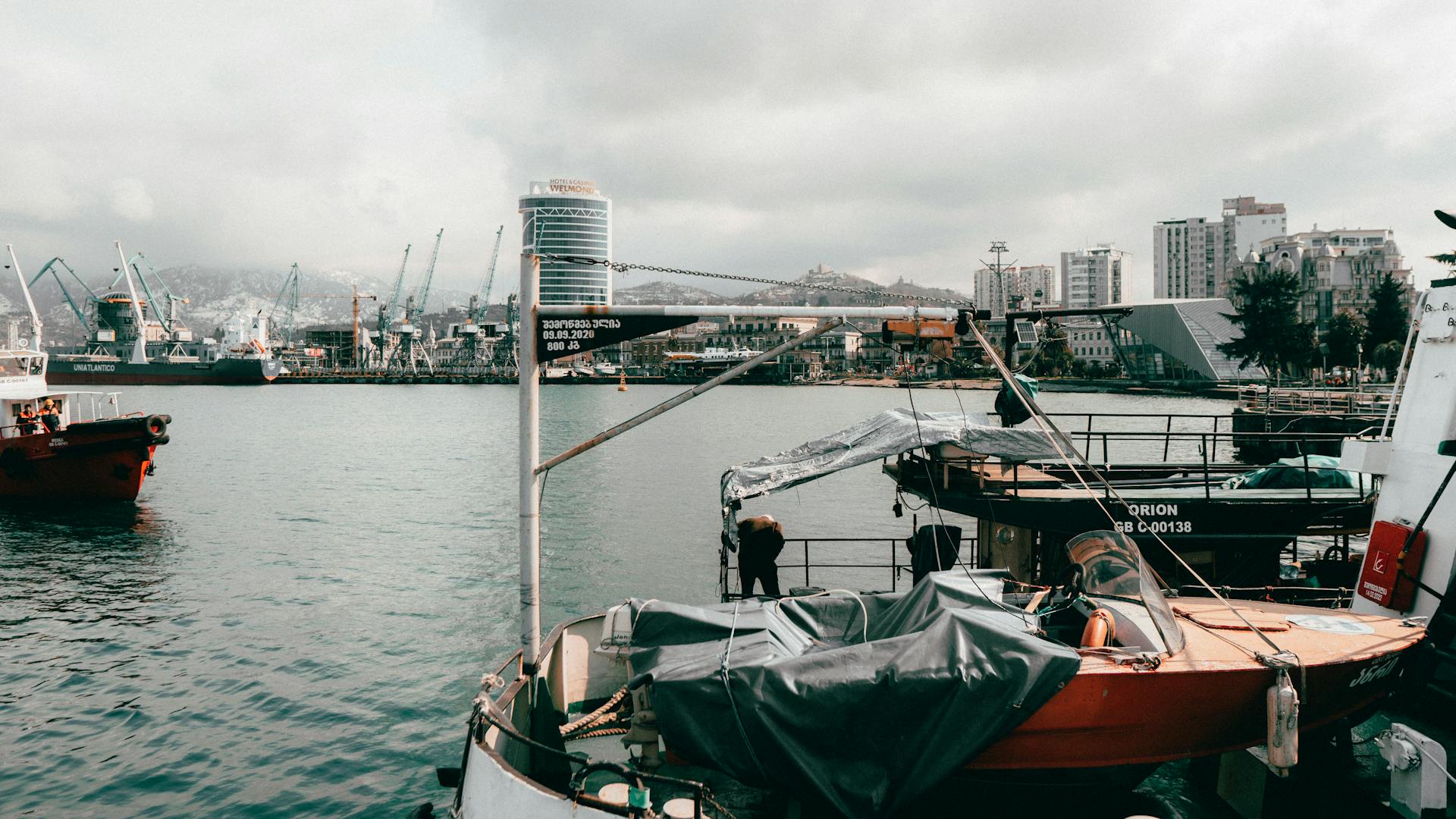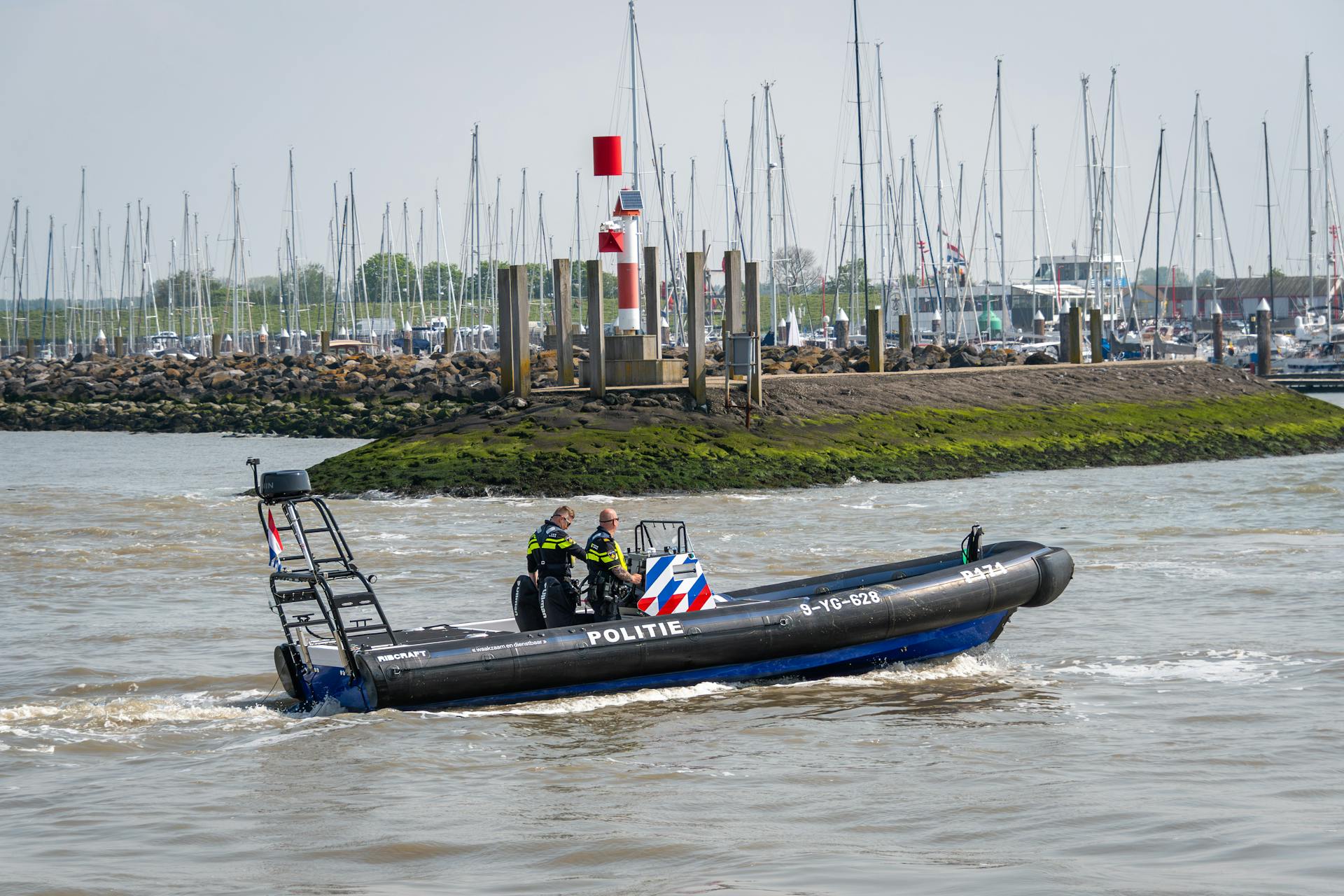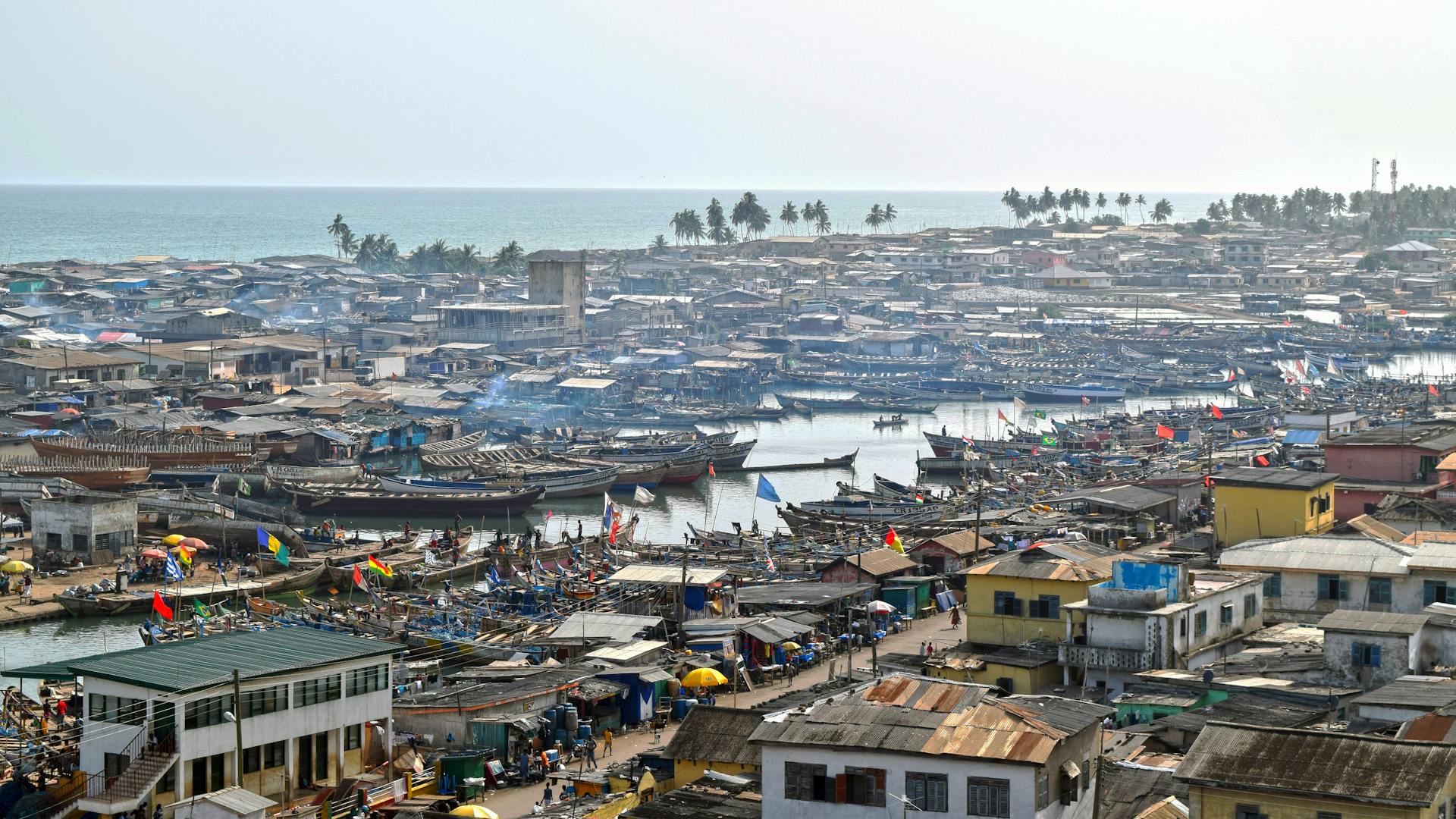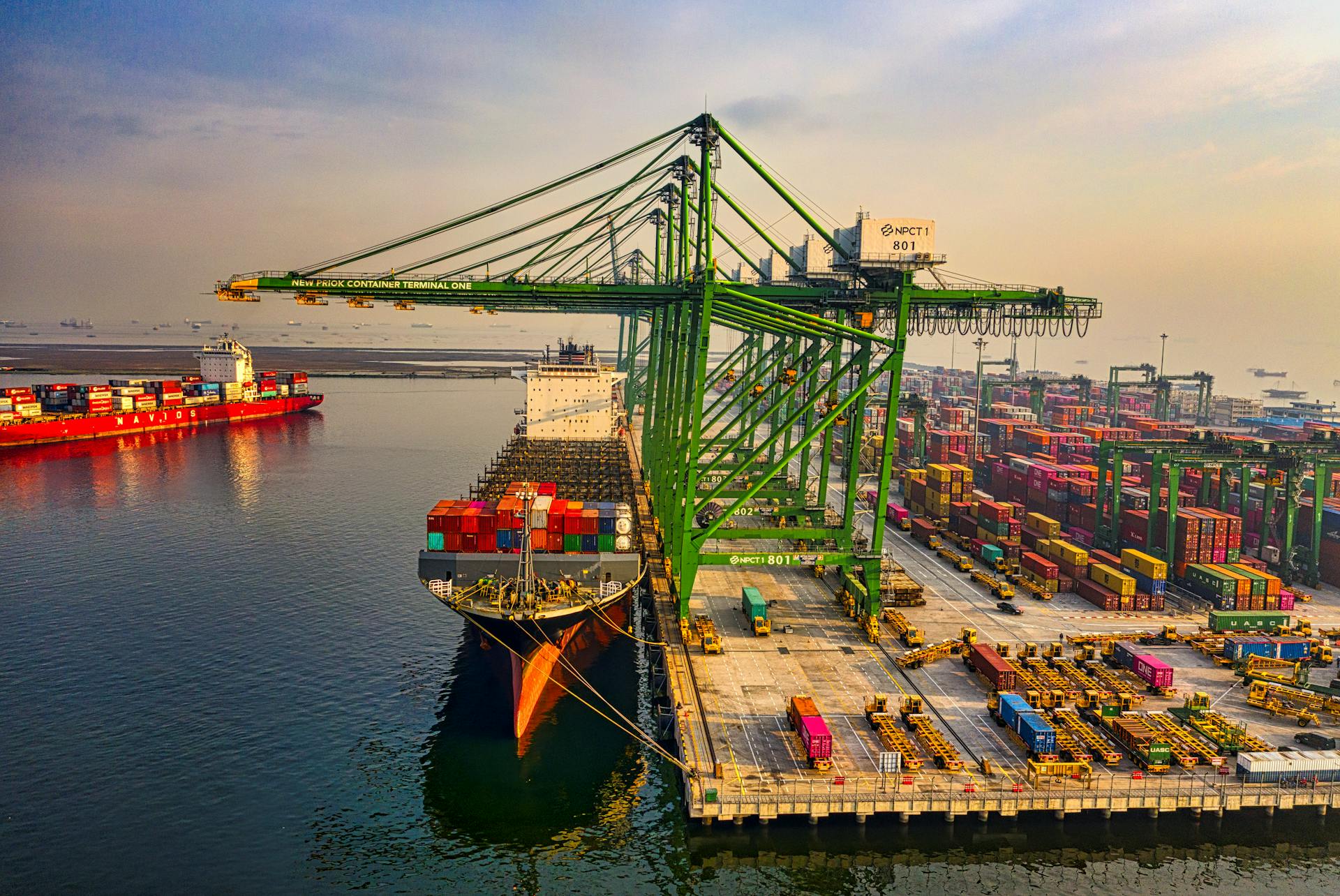
The Djibouti Ports & Free Zones Authority is a key player in the country's economic growth, overseeing the development and management of its ports and free zones.
The Authority was established in 1999, with the goal of transforming Djibouti into a major logistics hub.
Djibouti's strategic location at the crossroads of Europe, Asia, and Africa makes it an ideal location for international trade and commerce.
The country's ports and free zones offer a range of benefits, including tax incentives, streamlined customs procedures, and state-of-the-art infrastructure.
On a similar theme: Hamburg Port Location
History and Development
Djibouti's strategic location has led to increased port and shipping activity in the region, making it a hub for trade and commerce.
The World Bank estimates that Djibouti will maintain a 7% rate of growth in 2017, driven by large-scale investment in construction and infrastructure.
The Djibouti Ports & Free Zones Authority (DPFZA) plays a crucial role in this development, coordinating with government agencies and international partners to focus Djibouti's strategic development.
Fast-paced growth has led to an increase in competition and a diversification of consumer markets, transforming the economy in the long-term.
The DPFZA's highly trained staff work closely with government agencies and international partners to support the flow of capital investment and manage the construction of railways, airports, and power plants.
Financial institutions, such as the Central Bank of Djibouti (Banque Centrale de Djibouti, BCD), are also working to develop new regulation, frameworks, and technological solutions to support growth, manage risk, and promote increased corporate and financial activity.
Infrastructure
Djibouti Ports & Free Zones Authority has invested heavily in modernizing its infrastructure, with the aim of increasing efficiency and reducing costs.
The authority has built a state-of-the-art container terminal at the Port of Djibouti, which has increased the port's capacity to handle large volumes of cargo.
Djibouti's strategic location on the Bab-el-Mandeb Strait makes it an ideal hub for international trade, with the port serving as a key gateway to the African market.
The Port of Djibouti is equipped with advanced technology, including automated cranes and a sophisticated tracking system, which enables real-time monitoring of cargo movements.
The authority has also established a number of free zones, including the Djibouti International Free Trade Zone, which offers businesses a range of benefits, including tax incentives and streamlined customs procedures.
Free Trade Zone
The Djibouti International Free Trade Zone (DIFTZ) is a game-changer for the region. It will transform trade in the area and provide a strategic base for global businesses to access the rapidly growing African market.
Construction of DIFTZ began just a week after the completion of the Addis Ababa-Djibouti Railway, a new 752 km track linking Ethiopia's capital with the Port of Djibouti. This new railway is a significant infrastructure development.
The DIFTZ Project Preparatory Group was formed by the Djibouti Ports & Free Zones Authority, China Merchants Group, Dalian Port Authority, and IZP. Together, they are overseeing the construction of the $3.5 billion dollar free-trade zone.
The free-trade zone spans over 4,800 hectares, making it a massive development. It's expected to create 200,000 new jobs, which will have a positive impact on the local economy.
Statistics and Services
The Djibouti Ports & Free Zones Authority offers a range of services in coordination with government agencies.
They provide a mix of commercial and non-commercial services, which cater to various needs of users.
In terms of services, the authority works closely with relevant government agencies to ensure a seamless experience for those utilizing their services.
Port Statistics
The Port Statistics section provides valuable insights into the investment, capacity, employment, and completion status of various ports in the region.
The Port of Tadjourah, for instance, has an investment of $78 million, with a capacity of 4 million tons per year.
The Doraleh Multi-Purpose Port stands out with an investment of $590 million, making it one of the most significant investments in the region.
The capacity of the Doraleh Multi-Purpose Port is 8,779,000 tons per year, a staggering number that highlights its importance in the maritime industry.
Here's a breakdown of the investment and capacity of some of the major ports in the region:
The Port of Goubet has a capacity of 5 million tons per year, with a significant investment of $64 million.
The Damerjog Livestock Port has a capacity of 10 million heads of livestock per year, with an investment of $70 million.
The Ship Repair & Dry-docks has an investment of $200 million, with a significant construction workforce of 1000 workers during the construction phase.
The LNG Terminal has a massive investment of $2.8 billion, with a capacity of 10 million cubic meters.
Services
The Djibouti Ports & Free Zones Authority offers a mix of commercial and non-commercial services, in coordination with the relevant government agencies. This means that you can expect a wide range of services to support your business needs.
Commercial services are available to help your business thrive in Djibouti. Non-commercial services, on the other hand, are designed to support the community and local development.
Financing and Partnerships
Djibouti Ports and Free Zones Authority has engaged in projects with renowned global partners to strengthen Djibouti's role as a logistics and infrastructure hub.
The $15 billion expansion program includes the development of airports, highways, and other key national infrastructure projects.
This growth is supported by commercial institutions like the Djibouti International Free Trade Zone and the Silk Road International Bank, which have been set up to modernize existing services and facilitate the development of these projects.
Strategic partnerships have been established with global partners to drive economic growth and development in Djibouti.
Djibouti's proximity to developing landlocked economies such as Ethiopia provides opportunities for bilateral and multi-lateral cooperation, including a model of regional integration that has been praised between the two countries.
Authority
The Djibouti Ports & Free Zones Authority is a government agency that oversees the country's ports and free zones. It was established in 1999.
The Authority is responsible for managing the Doraleh Container Terminal, which is one of the busiest ports in the region. The terminal has a capacity to handle 1.5 million containers per year.
The Djibouti Ports & Free Zones Authority is also responsible for the development of the free zones, which are designated areas that offer businesses tax incentives and streamlined regulations.
For more insights, see: Ports in Frankfurt Am Main
Company Set Up
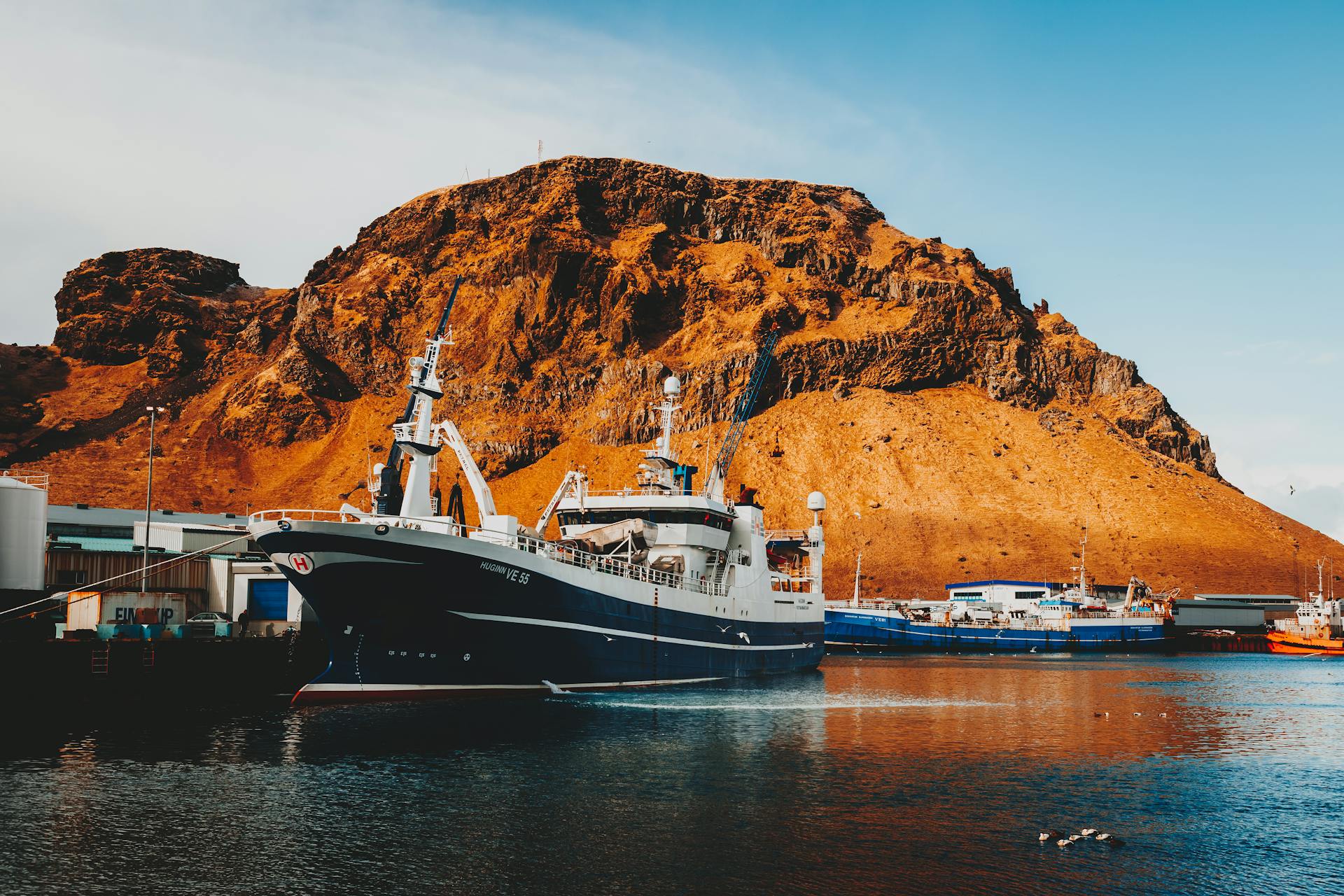
Setting up a company in Djibouti can be a straightforward process, thanks to the Djibouti Ports & Free Zones Authority (DPFZA). The DPFZA regulates the procedures for setting up a company in Djibouti, making it easier for applicants to obtain a license to operate.
To operate a company in Djibouti, you'll need to obtain a license through the DPFZA. This authority is responsible for processing work permits for foreign workers, which can be done concurrently with company applications.
Transport Licensing
The Djibouti Ports & Free Zones Authority plays a crucial role in regulating the transport and logistics industry in Djibouti. It's responsible for issuing licenses to companies operating within Djibouti or its ports.
To get a license, companies need to meet certain requirements, which the Authority regulates. This includes compliance and performance audits, as well as cost frameworks for maritime and freight shipping.
The Authority issues licenses for companies operating in various sectors, including maritime and freight shipping. This is essential for ensuring smooth operations and maintaining high standards in the industry.
Here are some key facts about the Djibouti Ports & Free Zones Authority's role in transport licensing:
- Established in 2004 as a government agency
- Regulates cost frameworks for maritime and freight shipping
- Issues licenses for companies operating within Djibouti or its ports
Djibouti Ports and Zones Authority
The Djibouti Ports and Free Zones Authority (DPFZA) plays a crucial role in regulating the procedures for setting up a company in Djibouti. It's responsible for issuing licenses to operate and processing work permits for foreign workers.
Applicants can obtain a license to operate through the DPFZA, making it a one-stop-shop for businesses looking to establish themselves in the country. This streamlined process helps to facilitate the growth of foreign investment in Djibouti.
The DPFZA oversees the construction, management, and administration of several ports and facilities in coordination with Djibouti's government agencies. This includes the Port of Djibouti, which is linked to Ethiopia's capital through the 752 km Addis Ababa-Djibouti Railway.
The DPFZA also partners with international companies to develop the Djibouti International Free Trade Zone (DIFTZ). This ambitious project aims to create 200,000 new jobs and cement Djibouti's position as a key player in global maritime trade routes.
The DIFTZ Project Preparatory Group, formed with China Merchants Group, Dalian Port Authority, and IZP, is working towards a $3.5 billion dollar free-trade zone that spans over 4,800 hectares.
Frequently Asked Questions
How do I register a company in Djibouti?
To register a company in Djibouti, you must first register with ANPI and then incorporate your company through the Djiboutian Office for Industrial and Commercial Property (ODPIC). Registration in the Commercial Register is a required step in the process.
Why is Djibouti port important?
Djibouti port is a major logistics hub due to its strategic location at the entrance to the Red Sea and seven specialized ports. This makes it a key trading hub on the global trade route.
Sources
- https://en.wikipedia.org/wiki/Djibouti_Ports_%26_Free_Zones_Authority
- https://cioafrica.co/afreximbank-leads-155-million-strategic-facility-for-djibouti-ports-and-free-zone-authority/
- https://allafrica.com/list/aans/post/af/cat/business/pubkey/publisher:editorial:00011723.html
- https://allafrica.com/list/aans/post/af/cat/trade/pubkey/publisher:editorial:00011723.html
- https://djiboutipress.com/en/news/1928
Featured Images: pexels.com
